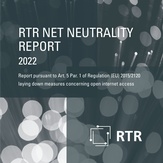Net Neutrality Report (29.06.2022)
Telecoms regulator RTR has now published the 2022 Net Neutrality Report, the sixth annual report on the status of net neutrality in Austria. The report follows the familiar and proven format, presenting in systematic detail the issues facing the regulatory authority and stakeholders during the period under review (May 2021–April 2022). How free is the internet in Austria? What steps need to be taken to safeguard net neutrality? What new issues are appearing on the national and European horizon?
War in Ukraine: internet blocking
The war in Ukraine and the EU’s response, namely to adopt new sanctions against state-affiliated Russian media, have also involved national and EU regulatory authorities, specifically due to mandatory internet blocks of the websites run by RT and Sputnik.
Internet blocking has in general become an ongoing concern in recent years. The mechanism is being applied in a growing number of areas: copyright law, consumer protection law, as a wartime sanctions measure or even as a market control tool for products offered in the EU. As a result, ISPs are being held accountable with increasing frequency for enforcing legislation relating to online activities. The current legislative framework faces national regulatory authorities, providers and internet users with a dilemma, raising the question of how to strike a balance between legal certainty, legal protection and the fundamental rights of all stakeholders concerned.
Unexpected ban on zero-rating
The ECJ re-examined zero-rating issues in late 2021, handing down three landmark decisions that have made it necessary to revise the guidelines on the open internet issued by the Body of European Regulators for Electronic Communications (BEREC). Zero-rating products in which the rate charged to a customer for certain portions of internet data traffic differs from the rate applying to the rest of the traffic are no longer permitted. Within the framework of the competent BEREC Open Internet Working Group, the RTR ‘Net Neutrality and Customer Contracts’ expert team, together with other European regulatory authorities, worked feverishly to revise the guidelines. Just a few days ago, the committee responsible at BEREC adopted and published the new version. This means that the ‘classic’ form of zero-rating is now a thing of the past. Austrian regulatory authorities RTR and TKK have already collected the required information and data from market participants and evaluated this material. Based on the picture that emerges and under consideration of the newly updated BEREC Guidelines, the necessary steps will be taken to safeguard net neutrality in Austria.
Current developments in the EU
Looking to the past, last year’s Net Neutrality Report had pointed out how net neutrality had been a highly controversial issue before 2015, when the Net Neutrality Regulation was being prepared. A seemingly irreconcilable conflict at that time had centred on issues including: the opportunities for monetisation available to access networks, and the contribution to be made to infrastructure development by over-the-top players (OTTs), while the question was also debated as to how to ensure fairer competition (i.e. a level playing field) between access networks (ISPs) and OTTs. This debate died down once the EU adopted its net neutrality rules. But the calm was apparently short-lived, as the debate about content providers potentially contributing toward the ‘use’ of ISPs’ networks has rekindled. Currently, the limits and relevance of net neutrality are once again being discussed in Brussels and throughout Europe. This could soon result in decisions that would have broad consequences for the internet, ones that would affect each and every one of us.
Further increase in internet speeds available in Austria
RTR’s observations reveal a positive trend in the availability of internet access services during the current reporting period. In particular, both download and upload speeds have further improved. The continued availability of internet access services at a level of quality that duly reflects advances in technology has been consistently ensured, also in this reporting period.
Conclusions
Safeguarding net neutrality is an ongoing concern, with new or newly recognised challenges and opportunities arising almost daily in our regulatory activities. Yet, on the whole, we can confirm that in Austria the open internet has been ensured. In our work with ISPs, we as a regulatory authority continue as before to pursue the policy of identifying breaches of the Net Neutrality Regulation (through monitoring) while raising awareness of the topic among providers. The ultimate goal here is to create a stable environment for entrepreneurial activity and innovation, while at the same time consistently safeguarding end users’ rights to free access to an open internet.
